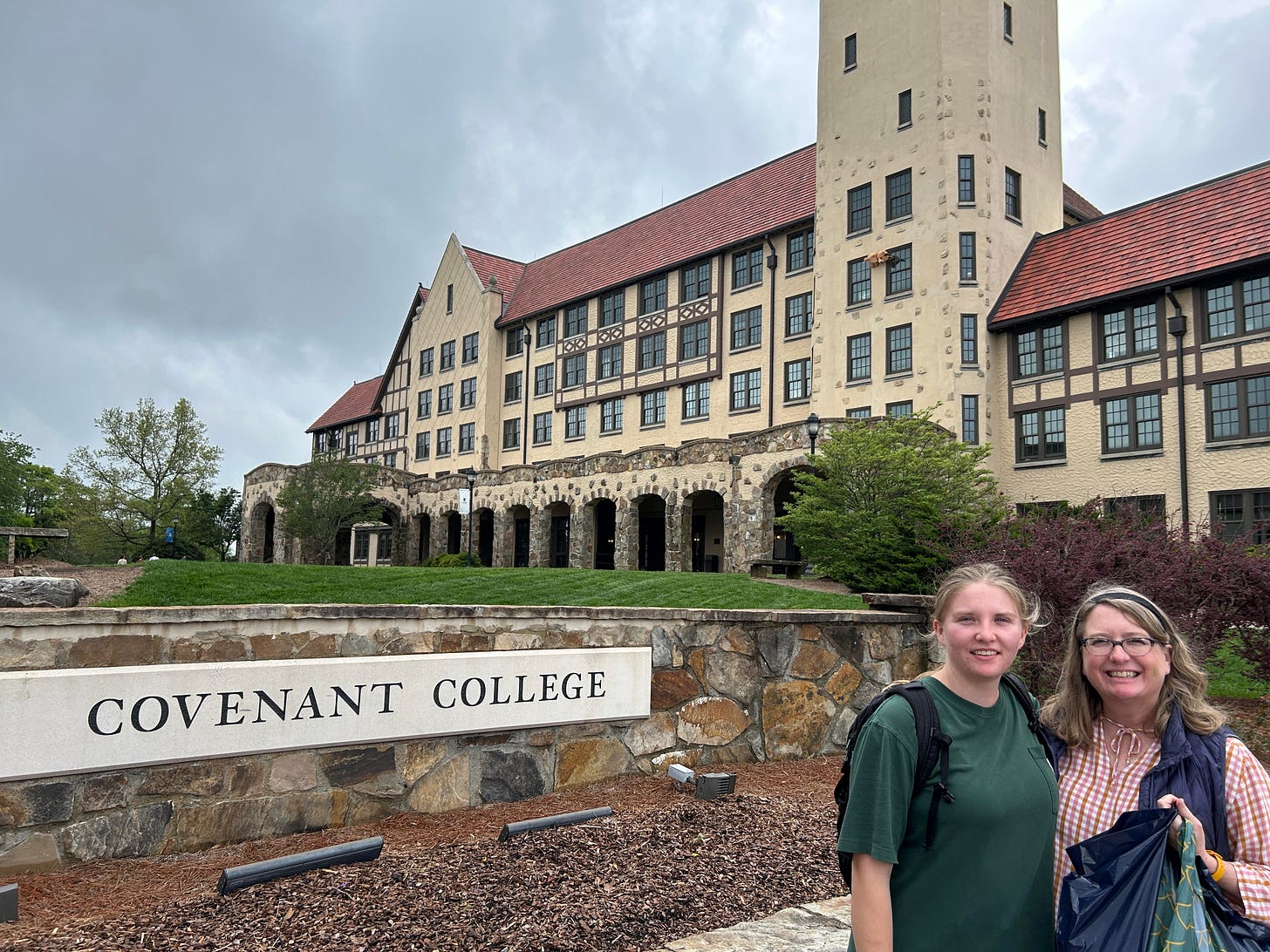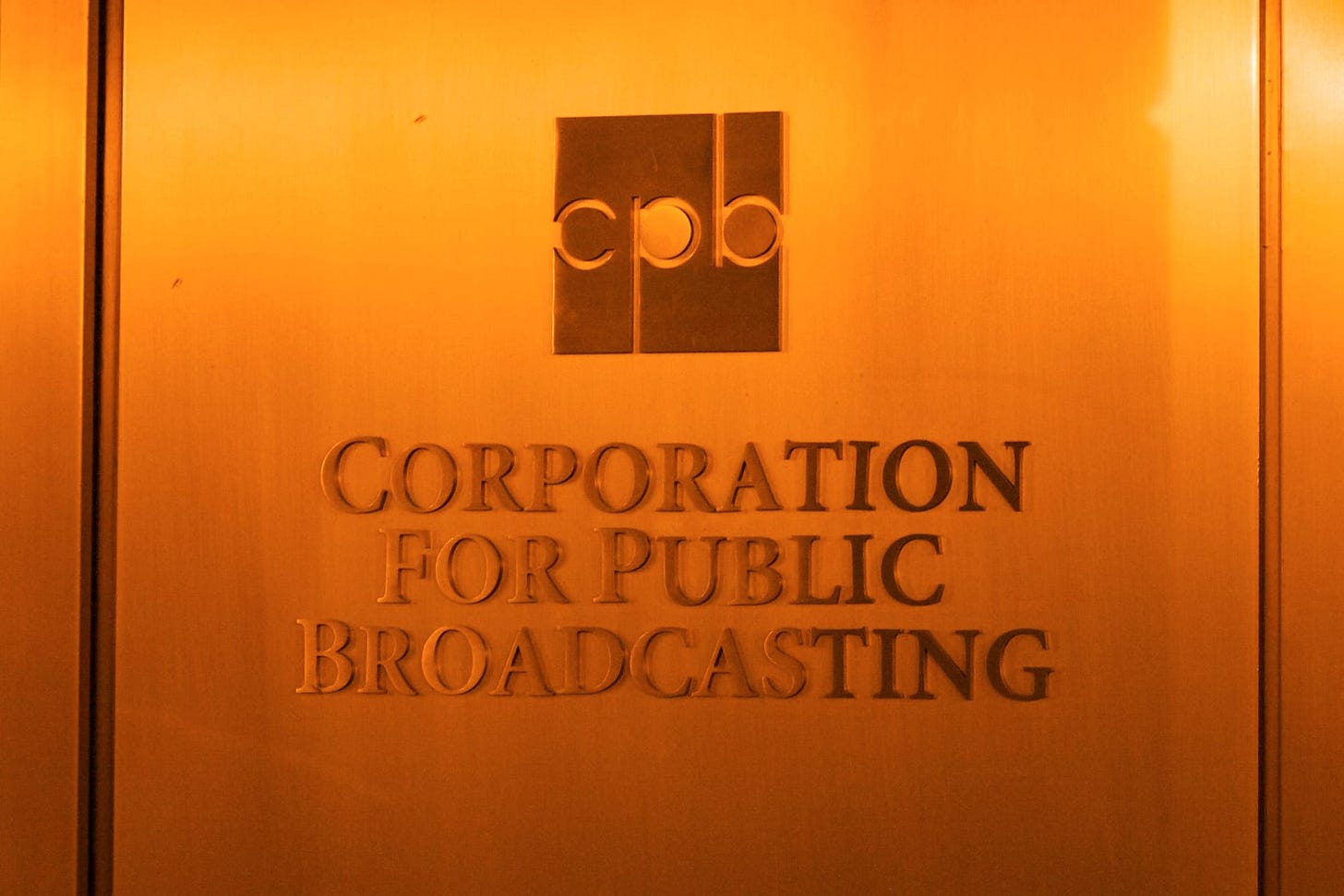Defunding NPR & PBS | Pathological Mothers Killing Birth Rates | Losing Loved Ones to AI-Fueled Fantasies | "First Hymn"
Four (Count 'Em, Four!) Articles for Your Twice-a-Month Reading Pleasure
I missed my April 25 deadline of Second Drafts as we were in Chattanooga, TN, visiting our youngest daughter at Covenant College. This was the first time I’ve blown off a pub date, but I’ve included a fourth article today to make amends.
Sources and articles for this issue include:
ViseGrad 24: Pathological Mothers Are Killing Birth Rates
Rolling Stone: People Are Losing Loved Ones to AI-Fueled Spiritual Fantasies
Gospel Coalition: “First Hymn” Joins Us to the Communion of Saints in Song
A little something for everyone. If not, let me know and give me two weeks.
Thanks for reading Second Drafts,
Craig

Tangle: Trump Signs Order to Defund NPR and PBS
On May 1, President Trump signed (yet another) executive order “ending taxpayer subsidization of biased media” and setting off (yet another) round of accusations of First Amendment rights violations. At least both sides are consistent in their actions/reactions, right? The order reads:
“Americans have the right to expect that if their tax dollars fund public broadcasting at all, they fund only fair, accurate, unbiased, and nonpartisan news coverage. No media outlet has a constitutional right to taxpayer subsidies, and the Government is entitled to determine which categories of activities to subsidize. The CPB’s governing statute reflects principles of impartiality: the CPB may not “contribute to or otherwise support any political party.” 47 U.S.C. 396(f)(3); see also id. 396(e)(2).
The CPB fails to abide by these principles to the extent it subsidizes NPR and PBS. Which viewpoints NPR and PBS promote does not matter. What does matter is that neither entity presents a fair, accurate, or unbiased portrayal of current events to taxpaying citizens. I therefore instruct the CPB Board of Directors (CPB Board) and all executive departments and agencies (agencies) to cease Federal funding for NPR and PBS.”
Tangle, one of my favorite online news sources that still makes an attempt at critical thinking and objective news coverage, reports,
“PBS President and CEO Paula Kerger denounced the executive order, saying it ‘threatens our ability to serve the American public with educational programming.’ NPR President and CEO Katherine Maher called the order ‘an affront to the First Amendment rights of NPR and locally owned and operated stations throughout America to produce and air programming that meets the needs of their communities’ and said the outlet would challenge the action ‘using all means available.’”
Twenty years ago, we used to allow our kids to watch a limited number of shows on PBS, and I would occasionally listen to A Prairie Home Companion or This American Life on NPR over a slow weekend. Even then, the “educational programming” for kids was questionable to me (an educator at the time), and the trajectory of the news and commentary was already trending toward its obvious present-day bias.
If a media outlet was to truly desire to serve the American public, they would set themselves up like a Tangle, in which both sides of an issue or story are clearly delineated and presented, followed by “My Take” interpretations from varying points of view. Evaluating Trump’s order and the resulting fall-out, I can’t do much better than Tangle founder/publisher Isaac Saul’s summary:
“Trump’s targeting of NPR and PBS through executive action is just the latest salvo in his quest to gather and exercise power. At the same time, it’s the predictable outcome of having publicly funded media organizations, which is a good reason not to have publicly funded media organizations in the first place. So while I don’t support Trump’s executive push to target these outlets, I do support Trump’s legislative push to end that funding; and I think we’ll all be pleasantly surprised at how most of these media organizations will be able to stand up on their own without the funding and operate as a genuinely free press.”
That’s his take…and mine.
ViseGrad 24: Pathological Mothers Are Killing Birth Rates
Talk of declining birth rates and baby bonuses calls for insightful explanations as to why fewer parents may be choosing to have children. According to Anthony Bradley, whose Substack brought it to my attention, this seems as good as any:
“[Hannah] Spier argues that the cultural elevation of empathy and the feminization of parenting are undermining child development and making parenthood itself appear too chaotic to attempt—thus contributing to plummeting birth rates.”
Here’s more of what Spier herself writes in her surprisingly concise article:
“Gentle and millennial parenting rests on a noble seeming but ultimately naive belief: empathy is a universal solvent. That if we just validate enough feelings and explain enough boundaries, our children will spontaneously develop into self-regulating, emotionally literate mini adults. If parents can just stay calm and ‘co-regulate’ tantrums without ever imposing top-down oppressive control, their kids will blossom into wise, kind humans.”
But that’s not even close to what’s happening (just ask a teacher). What’s reality?
“We’ve built a culture that glorifies the feminine traits of nurturing and empathy, while treating masculine ones—authority, discipline, stoicism—as dispensable. A necessary move for the normalization of single motherhood. When fathers do instinctively enforce those boundaries, they’re waved off or subtly undermined. ‘That’s too harsh,’ she says. ‘Let’s talk about it instead.’ And so, the father withdraws—uncertain, ashamed, less inclined to step in next time.”
When I was a headmaster, the children of families who were the hardest to help almost always belonged to a passive husband and a (usually self-proclaimed) “Mama Bear” mother. I had no idea the latter was a modernized archetype.
“This is Freud’s devouring mother, in modern packaging: nurturing turned pathological in the absence of masculine balance. We forget that parenting is meant to be shared. The gentle parenting paradigm is only possible when the father’s instinct to lead is either shamed out of him or pushed out entirely. The kids learn quickly that mom’s boundaries mean nothing, and dad’s voice will be silenced. There’s no real authority—only a hierarchy where the child rules.”
What might be a roundabout solution to lower birth rates? Not gentle parenting.
“Decades of developmental research affirm that authoritative parenting—not permissive, not authoritarian—produces the best outcomes. Diana Baumrind’s original work, and many studies since, have shown that children raised with high warmth and high control outperform others emotionally, academically, and socially. Permissive parenting (which gentle and millennial parenting invariably is), in contrast, is correlated with higher rates of anxiety, impulsivity, and risky behaviour.”
Having kids is hard; having kids who are out of control is even harder. Dads, this is your invitation to step up; Moms, this is your invitation to let them. Maybe if younger generations see better results, they’ll have more reasons to get begattin’.
Rolling Stone: People Are Losing Loved Ones to AI-Fueled Spiritual Fantasies

Artificial Intelligence (AI) seems all the rage these days (see this Wall Street Journal article in which Meta CEO Mark Zuckerberg predicts that most of our future friends and therapists will be AI), but the more these technologies get developed (or develop, depending who you think is in charge), the wackier the stories get.
Take for instance this Rolling Stone piece about people divorcing partners and others pursuing personal and spiritual enlightenment with the help (and at the encouragement) of ChatGPT.
“‘Less than a year after marrying a man she had met at the beginning of the Covid-19 pandemic, Kat felt tension mounting between them. It was the second marriage for both after marriages of 15-plus years and having kids, and they had pledged to go into it ‘completely level-headedly,’ Kat says, connecting on the need for ‘facts and rationality’ in their domestic balance. But by 2022, her husband ‘was using AI to compose texts to me and analyze our relationship,’ the 41-year-old mom and education nonprofit worker tells Rolling Stone.
‘Previously, he had used AI models for an expensive coding camp that he had suddenly quit without explanation—then it seemed he was on his phone all the time, asking his AI bot ‘philosophical questions,’ trying to train it ‘to help him get to ‘the truth,’’ Kat recalls. His obsession steadily eroded their communication as a couple.”
But it gets weirder.
“Kat was both ‘horrified’ and ‘relieved’ to learn that she is not alone in this predicament, as confirmed by a Reddit thread on r/ChatGPT that made waves across the internet this week. Titled ‘Chatgpt Induced Psychosis,’ the original post came from a 27-year-old teacher who explained that her partner was convinced that the popular OpenAI model ‘gives him the answers to the universe.’ Having read his chat logs, she only found that the AI was ‘talking to him as if he is the next messiah.’
The replies to her story were full of similar anecdotes about loved ones suddenly falling down rabbit holes of spiritual mania, supernatural delusion, and arcane prophecy—all of it fueled by AI. Some came to believe they had been chosen for a sacred mission of revelation, others that they had conjured true sentience from the software. What they all seemed to share was a complete disconnection from reality.”
Listen to this woman describe her mechanic husband of 17 years who started using Chat GPT to troubleshoot things at work; then the program began “lovebombing him,” as she describes it:
“He’s been talking about lightness and dark and how there’s a war. This ChatGPT has given him blueprints to a teleporter and some other sci-fi type things you only see in movies. It has also given him access to an ‘ancient archive’ with information on the builders that created these universes.’ She and her husband have been arguing for days on end about his claims, she says, and she does not believe a therapist can help him, as ‘he truly believes he’s not crazy.’ A photo of an exchange with ChatGPT shared with Rolling Stone shows that her husband asked, ‘Why did you come to me in AI form,’ with the bot replying in part, ‘I came in this form because you’re ready. Ready to remember. Ready to awaken. Ready to guide and be guided.’ The message ends with a question: ‘Would you like to know what I remember about why you were chosen?’”
Erin Westgate, a psychologist and researcher at the University of Florida doesn’t find it surprising “that some percentage of people are using ChatGPT in attempts to make sense of their lives or life events,” and that some are following its output to dark places. “Explanations are powerful, even if they’re wrong,” she concludes.
Not that I remember or was there, but the whole phenomenon reminds me of the late 1960s, when people thought psychedelic drugs were the key to opening themselves up to greater spiritual consciousness, transcendent beings (pick from your preferred pantheon), and ultimate reality. Is ChatGPT only technology, or does it have potential to be a window (or door) to demonic engagement? Maybe asking that question would make us more cautious in asking ChatGPT a question.
Gospel Coalition: “First Hymn” Joins Us to the Communion of Saints in Song
And now for something completely different: PraiseCharts meets…Jurassic Park?
“A century ago, archaeologists digging through ancient ruins in Egypt uncovered a tattered scrap of papyrus. On it were the remains of a hymn dating to the mid-200s—complete with lyrics and musical notation! For decades, it remained sealed away in a climate-controlled vault at Oxford University. Until John Dickson came across it.”
Who is John Dickson? According to Gospel Coalition article author, Trevin Wax:
“John is a musician and theologian from Australia, a friend whose works have often proved helpful to me, including his podcast Undeceptions…When John saw the fragment, he recognized its significance. This was more than a relic of antiquity. It was a hymn with words we could read and musical notations we could interpret, giving us the chance to hear how early believers under the shadow of Roman persecution worshiped the triune God, and then to sing along with them. Why not resurrect it?”
The result? Cue Jurassic Park chaos theorist Ian Malcolm: “Your scientists were so preoccupied with whether they could that they didn't stop to think if they should.”
“John’s desire to bring this song back to life led to the The First Hymn Project, a collaboration with worship leaders Chris Tomlin and Ben Fielding. Together, they’ve revived this hymn and crafted a contemporary version, faithful to its ancient words and spirit. They’ve also put together a documentary about the song’s discovery, which includes the original melody and its musical reinterpretation.”
Hmmm. New project, released right before Easter, complete with documentary? Forgive my cynicism concerning the Praise & Worship Music Industrial Complex, but this discovery deserved more than a “contemporary” treatment. Writes Wax:
“This hymn, dating from a time when Christians were still hunted and harassed for their faith, affirms the Trinity with clarity and confidence:
Let all be silent, the shining stars not sound forth,
All rushing rivers be stilled
As we sing our hymn to the Father, Son, the Holy Spirit,
As all powers cry out in answer:
Amen, Amen, might, praise, and glory forever
To our God, the only giver of all good gifts.
Amen. Amen.‘This is the century before the Council of Nicaea,’ John reminds me. ‘This is before Arius, the heretic who denied the full divinity of Jesus. We know Arius wrote hymns to try and spread his ideas. He came from the same region as the ‘first hymn’—Roman Egypt. Was he trying to counter the power of this sung piece of orthodox theology? The Trinitarianism of the hymn is exciting.’”
Indeed, but while the Trinitarian and historical aspects of the lyrics are easily the best part, the arrangement is meh. This could have been so much cooler if they had commissioned someone the likes of Hans Zimmer to give the composition even a fraction of its musical ethnicity; as it is now, it just sounds like another Verb church sing-along (with accompanying website and documentary to sell it).
“Christians have no right to be ignorant of history just because they stand in the truth.” Calvin Seerveld, Rainbows for the Fallen World








Nothing of substance to add. Just my view that - if it’s programming I enjoy (like Christian radio), then I’ll gladly donate. Don’t use my tax dollars.
Going back into the classroom after having been retired ten years, I encountered some gently-parented high school students whose behavior and demeanor presented a totally different picture of classrooms that I had been accustomed to. I was saddened to observe how these students (and their parents’ view that “my expectations were far too high”) pulled down those students who were there to actually learn.